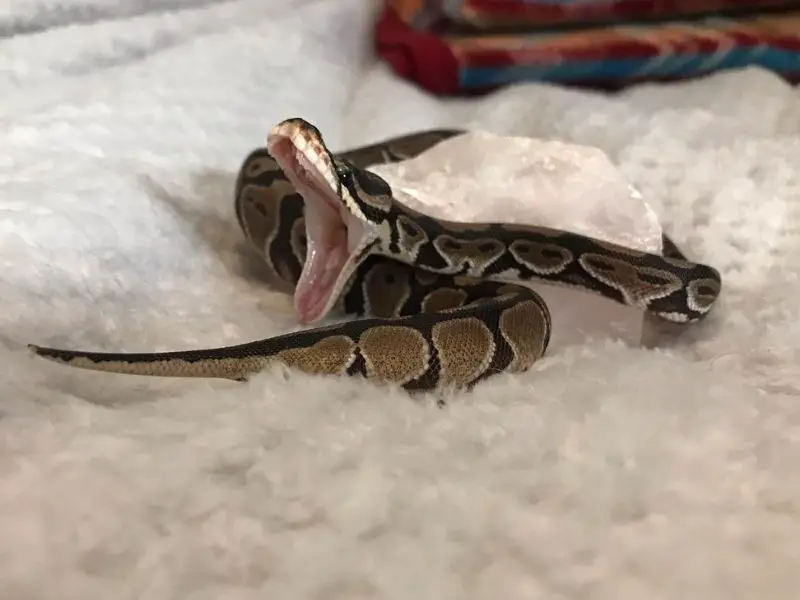Observing and understanding the behavior of ball pythons is essential as it can help you in knowing what your reptilian friend needs and wants. One such common behavior displayed by ball pythons and often observed by their owners is yawning. Consequently, read on to understand the meaning behind the yawning of the snake pet and what to do in such a case.
Is it normal for ball pythons to yawn?

Generally, the yawning of ball pythons is normal behavior. Most new snake owners though still wonder whether or not they should be concerned by the yawning of their reptilian pets. The concern is understandable since every snake keeper has a duty to ensure their reptiles live happier and healthier. Like humans, the yawning of this snake species is viewed as normal behavior and mainly observed before or after feeding and after sleeping.
But, if the yawning is not tied to these conditions and happens all the time, then that should worry you.
Why do ball pythons yawn?
Adjustment of Jaws
Ball pythons, like other snakes and reptiles, are known to possess big, elastic jaws, which enable them to easily swallow a whole prey such as gerbils, mice, and rats regardless of size. The jaws of ball pythons are vital in controlling the food eaten. The connection of their lower jaw is to tendons and ligaments, and not bone. In fact, what you and I may refer to as the yawning in regard to ball pythons in the real sense is about the stretching and readjustment of jaws to their congenial position.
Better Breathing
When a ball python wheezes or sneezes that may be a strong indication that it is suffering from a running nose or respiratory tract infection. Yawning is for enabling the opening of the airways and thus allows more transfer of air to the lungs. This leads to enhanced breathing, similar to how asthmatic patients breathe with their mouths for accessing more air since their nostrils have been narrowed. For a ball python not suffering from any respiratory illness, yawning is just normal behavior.
Stretch Out Jaw Muscles
Jaw muscles, tendons, and ligaments provide the jaw of a ball python with the flexibility of a gymnast. From time to time, the snake pet may need to stretch out the muscles, tendons, and ligaments of the jaw to enhance the circulation of blood, posture of the body, and achieve greater strength and flexibility.
Regurgitation
Although a ball python is capable of swallowing a whole prey, the disadvantage is that the process of digestion fails to break down the fur, leading to its accumulation in the stomach. In that situation, the best way to eliminate the fur is by regurgitating it out, which involves the pet opening its mouth in a manner you would think it is yawning.
Also, a snake pet may appear to be yawning when it is about to vomit or vomiting.
Stretch Out Its Body
Apart from yawning to stretch out its jaws, a ball python also performs this normal activity to stretch or exercise the rest of the muscle across its body. The stretching out of the body is often done after being immobile for an extended period. Before the snake can begin to move again, it may start with yawning and gaping. This is similar to how you often stretch, either after waking up or sitting down for a prolonged time.
Sitting or sleeping for long causes muscles to be tight and tensed, partly remedied by stretching.
Get Ready to Eat
Ball pythons often yawn when they are getting ready to feed. By performing a simple yawn, the jaw of the pet realigns or repositions itself in preparation for swallowing a whole prey. Generally, unlike mammals, reptiles like snakes possess flexible or elastic skulls allowing for the swallowing of prey, without chewing, with a bigger bodyweight than them. Usually, though, the prey of a ball python is less than a third of its body weight.
READ ALSO: Dehydrated Ball Python – Signs, Reasons + What to Do
What does it mean when a snake yawns too often?
A snake yawning too often may be due to ill-health or to recognize the adjacent environment. A potential sign for a snake with mouth rot is constant scratching of the mouth on objects within the enclosure like water bowls while common signs of respiratory illness include lethargy and refusal to eat.
Your pet snake yawning frequently may be because of an underlying health issue needing an urgent treatment solution. The most common types of snake illnesses are respiratory illness and infectious stomatitis. A respiratory infection makes it difficult for normal breathing to happen without the frequent behavior of yawning and gasping for ample air since the nostrils are congested.
A snake may also yawn frequently to detect and grasp the odor or chemical particles of its surrounding environment since it suffers from poor vision naturally. Many owners of pet snakes report having seen their tongues sticking in and out, having opened their jaws. This sensing is made possible by an organ in the mouth of the snake known as the vomeronasal organ (VNO) Combining with the tongue, the organ detects, collects, and forwards chemical signals, cues, or messages to the central nervous system. The organ also assists in snake movement.
What to do if a ball python yawns too much
Feed The Snake
If your ball python is yawning too much it may simply mean that your reptilian friend is hungry. Just the same way humans usually yawn when hungry. It is your duty to feed your pet accordingly so that it does not yawn frequently because of hunger. Providing sufficient food to a ball python helps quell the yawning and the need to roam around in search of prey.
Assess Its Enclosure
A living environment that is too hot is not conducive to the well-being of your pet. Such an environment forces your snake pet to yawn too much, which is necessary for body temperature regulation. When the weather is excessively hot, a ball python likes to relocate under shades and rocks to cool off, according to experts. Therefore, the design of the pet’s enclosure should incorporate a shade and provide drinking or soaking in water, necessary for keeping the pet hydrated.
Visit a Vet
Taking your snake pet to a professional veterinarian is important for diagnosing whether or not the reptile suffers from poor health. If the snake is ill, the snake veterinarian will prescribe the right treatment or drug dosage according to the size, age, and species of the reptilian pet. Restoring the health of an ill ball python is a must in order to achieve normal gasping and yawning.
Euthanize
Inclusion Body Disease (IBD) is one common highly contagious and life-threatening disease that likes to attack ball pythons. The disease causes muscular disfigurement, progressing slowly or swiftly, ultimately killing your pet because of suffocation and or starvation.
A pet that has been attacked by IBD displays symptoms such as stargazing or head lifting, constipation, lethargy, disorientation, vomiting, and refusal to eat. The signs and symptoms of IBD are often accompanied by a ball python gasping and yawning. Euthanasia is advised to end its excruciating pain and suffering. Avoid trying to keep the pet alive by force-feeding and hydrating it.
In Conclusion
Ball pythons are some of the cutest and friendliest companions at home. It is commonplace to find ball pythons gracing circus shows and functions across the globe. Recognizing a ball or royal python is straightforward as it has unmistakable scale patterns, and among the python species, it is the smallest. It is rare for the snake pet to pose any threat to you unless it feels endangered. These pets are ideal at home since they are non-venomous and not huge enough to swallow you. As well, a captive, healthy ball python can assist with rodent control and prevention.
In case you spot your pet yawning and gasping, this post supplies you with the appropriate help needed for identifying the reason and right cause of action. Hopefully, the information this post avails is sufficient for your needs as a ball python owner.
READ NEXT: Can Ball Pythons Eat Eggs?

